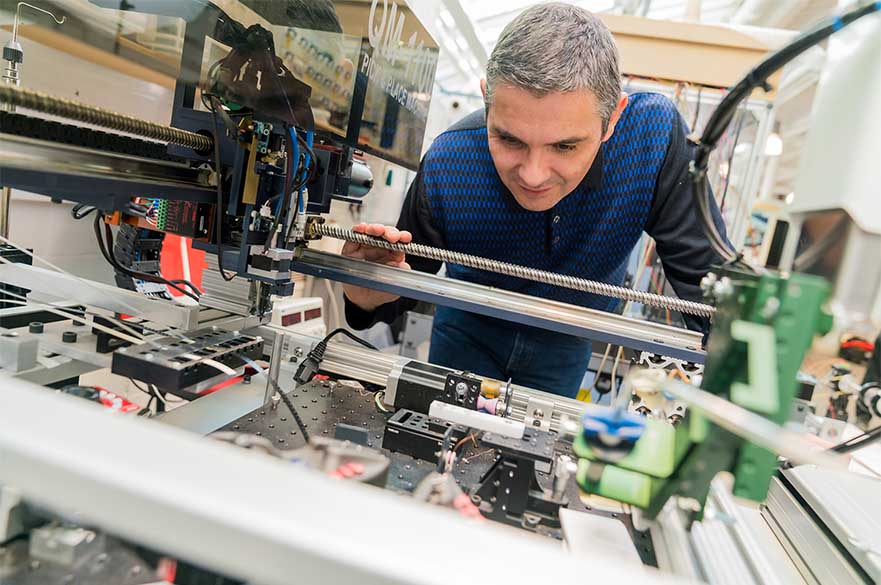Project to pave way for first wearable textiles computer
T-Shirts used as mobile phones sounds like the stuff of science fiction. But a research project led by Nottingham Trent University could turn such future-gazing tech into reality.
By Emily Oakden | Published on 7 November 2019
Categories: Press office; School of Art & Design;

T-Shirts used as mobile phones sounds like the stuff of science fiction.
But a research project led by Nottingham Trent University could turn such future-gazing tech into reality.
The university’s Advanced Textiles Research Group (ATRG) has been given £1.3m to advance the technology that will pave the way towards the world’s first wearable computer.
The project aims to create a manufacturing process to enable complex electronic circuitry to be embedded into yarns on an industrial scale.
The research group – which has already pioneered technologies such as clothes embedded with solar cells to charge mobile phones – will develop the process for creating electronic yarns – or E-yarns - over the next three years.
Professor Tilak Dias, who leads the ATRG, in the university’s School of Art & Design, said: “This project will allow us to take a quantum leap towards seeing wearable E-textiles on the open market.
“Complex E-yarns circuitry – which is undetectable to the wearer – will allow for the development of wearable electronics as sophisticated as computers.
“It could literally mean that in the future your T-Shirt or jacket could be used as a mobile phone, with your collar being used to speak in to.
“But to the naked eye, it would appear like any other item of clothing, and none of the technology would be felt by the wearer.
“The garments would also be fully washable and wearable, like any other form of clothing.
“But embedded into the yarn of the fabrics would be high-tech electronics which can monitor your heart rate, your blood-oxygen levels, be used as a communications device, and more.”
The grant was awarded by the Engineering and Physical Sciences Research Council (EPSRC), and is the largest grant from the council currently held by a school of art and design.
Co-investigator Dr Theodore Hughes-Riley added said: “For years we have developed a range of high-quality working concepts, but this project will enable us to take our research from prototypes to the production line.
“It will enable private companies, for the first time, to consider the realistic prospect of manufacturing these electronic-textiles en masse which have the potential to change people’s lives.”
The project will involve various stages which will include the development of prototype demonstrators which will be trialled and tested with industrial partners. Aims will include the creation of a pilot production line which works at speed and at low cost.
Senior Lecturer Will Hurley, who is also a co-investigator on the project, said: “E-yarns have the potential to revolutionise the textiles industry and the industries that use textiles.
“They could be used in multiple sectors, including medical, defence, aerospace, performance sports, automotive and fashion.
“Developing this technology would provide the UK with an important competitive advantage in what we expect will become a global market.
“Though there will be many more steps to take, this project is a significant development which will play a huge part in turning science fiction into reality.”
Notes for Editors
Notes to editors:
* Press enquiries please contact Chris Birkle, Public Relations Manager, on telephone +44 (0)115 848 2310, or via email
About Nottingham Trent University
Nottingham Trent University (NTU) was named University of the Year 2019 in the Guardian University Awards. The award was based on performance and improvement in the Guardian University Guide, retention of students from low-participation areas and attainment of BME students. NTU was also the Times Higher Education University of the Year 2017, and The Times and Sunday Times Modern University of the Year 2018. These awards recognise NTU for its high levels of student satisfaction, its quality of teaching, its engagement with employers, and its overall student experience.
The university has been rated Gold in the Government’s Teaching Excellence Framework – the highest ranking available.
It is one of the largest UK universities. With nearly 32,000 students and more than 4,000 staff located across four campuses, the University contributes £900m to the UK economy every year. With an international student population of more than 3,000 from around 100 countries, the University prides itself on its global outlook.
The university is passionate about creating opportunities and its extensive outreach programme is designed to enable NTU to be a vehicle for social mobility. NTU is among the UK’s top five recruiters of students from disadvantaged backgrounds. A total of 82% of its graduates go on to graduate entry employment or graduate entry education or training within six months of leaving. Student satisfaction is high: NTU achieved an 88% satisfaction score in the 2018 National Student Survey.
NTU is also one of the UK’s most environmentally friendly universities, containing some of the sector’s most inspiring and efficient award-winning buildings.
NTU is home to world-class research, and won The Queen’s Anniversary Prize in 2015 – the highest national honour for a UK university. It recognised the University’s pioneering projects to improve weapons and explosives detection in luggage; enable safer production of powdered infant formula; and combat food fraud.